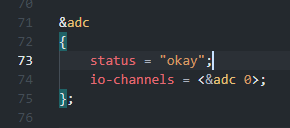Hello,
I am using nrf52840 on usb dongle and i would like to measure voltage on a specific ADC input pin.
According to the datasheet, i use P0.02/AIN0.
My problem is that adc_read() function returns -22 error.
I am posting the code and the overlay file. Could you please help me what i am doing wrong here?
Thanks a lot guys!
Thanos
&adc
{
status = "okay";
io-channels = <&adc 0>;
};
#define ADC_RESOLUTION 12
#define ADC_GAIN ADC_GAIN_1
#define ADC_REFERENCE ADC_REF_INTERNAL
#define ADC_ACQUISITION_TIME ADC_ACQ_TIME(ADC_ACQ_TIME_MICROSECONDS, 40)
#define ADC_CHANNEL_AIN0 0
#define ADC_IO_LABEL DT_GPIO_LABEL(DT_ALIAS(gpiocus1), gpios)
#define ADC_IO_PIN DT_GPIO_PIN(DT_ALIAS(gpiocus1), gpios)
const struct device *adc_dev;
const struct device *adc_en_dev;
uint32_t sample_buffer[10] = {0};
static struct adc_channel_cfg adcConfig =
{
.gain = ADC_GAIN,
.reference = ADC_REFERENCE,
.acquisition_time = ADC_ACQUISITION_TIME,
.channel_id = 1, // gets set during init
.differential = 0,
// #if CONFIG_ADC_CONFIGURABLE_INPUTS
// .input_positive = 0, // gets set during init
// #endif
};
const struct adc_sequence sequence =
{
.options = NULL, // extra samples and callback
.channels = BIT(ADC_CHANNEL_AIN0), // bit mask of channels to read
.buffer = sample_buffer, // where to put samples read
.buffer_size = sizeof(sample_buffer),
.resolution = ADC_RESOLUTION, // desired resolution
.oversampling = 0, // don't oversample
.calibrate = 0 // don't calibrate
};
//----------------------------------------------------------------------------------------------------------------------------------------------------------------------------
bool adc_init(uint8_t channel)
{
int adcInitError;
adc_dev = DEVICE_DT_GET(DT_NODELABEL(adc));
if(adc_dev == NULL)
{
return false;
}
adc_dev = device_get_binding(DEVICE_DT_NAME(DT_NODELABEL(adc)));
if(adc_dev == NULL)
{
return false;
}
adcConfig.channel_id = channel;
adcInitError = adc_channel_setup(adc_dev, &adcConfig);
if(adcInitError)
{
return false;
}
return true;
}
//----------------------------------------------------------------------------------------------------------------------------------------------------------------------------
uint32_t readBatteryVoltage(void)
{
int readBatteryVoltageError = 0;
readBatteryVoltageError = adc_read(adc_dev, &sequence);
if(readBatteryVoltageError == 0)
{
return sample_buffer[0];
}
return 0;
}
CONFIG_ADC=y CONFIG_ADC_ASYNC=y



